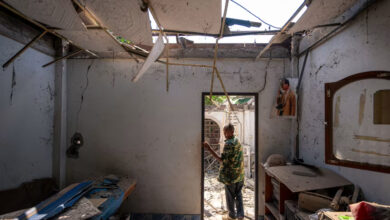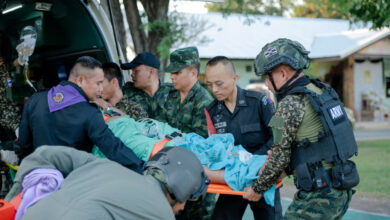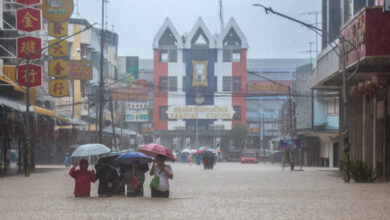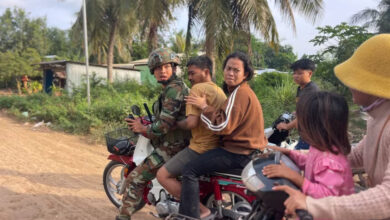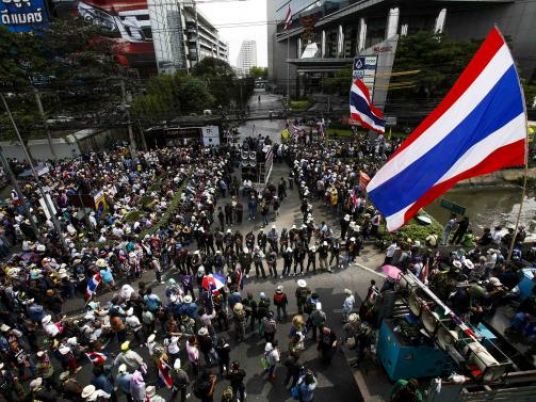
Protesters campaigning for months to oust Thai Prime Minister Yingluck Shinawatra turned their anger on businesses linked to her wealthy family on Thursday, rallying outside the offices of a property developer whose shares fell 5 percent.
Yingluck's government appears increasingly hemmed in by opponents and the judicial system, lacking the fiscal powers to fund key policies and warned by a court on Wednesday that it cannot use a state of emergency to disperse protesters.
Four protesters and a police officer were killed on Tuesday, in the deadliest clashes since the unrest began in November, when police attempted to reclaim sites near government buildings that have been occupied for weeks.
The protesters are seeking to unseat Yingluck and stamp out what they see as the malign influence of her brother, Thaksin Shinawatra, a self-exiled former premier regarded by many as the real power behind the government.
Around 500 protesters gathered outside the north Bangkok offices of SC Asset Corp, a property developer controlled by the Shinawatra family, waving Thai flags and blowing whistles.
"We will hamper all Shinawatra businesses," protest leader Suthep Thaugsuban told supporters at a Wednesday night rally. "If you love your country, stop using Shinawatra products and do everything you can so that their business fails."
Yingluck was executive chairwoman of the company before being swept to power in a landslide election victory in 2011.
Shares in SC Asset fell 5 percent on Thursday, following a similar fall the previous day. Shares in M-Link Asia Corp, a mobile handset distributor with links to the Shinawatras, have also lost almost 10 percent over the past two days.
Problems continue to mount for Yingluck, who has headed a caretaker government with limited spending powers since calling a snap election in December. Voting on February 2 was disrupted, and it could be months before a new government can be installed.
An anti-corruption agency this week filed charges against her over a soured rice subsidy scheme that has stoked middle-class anger and left hundreds of thousands of farmers, her natural backers, unpaid.
More than 1,000 farmers, many riding in farm trucks, were travelling in convoy towards Bangkok from the central plains, the main rice-growing area, on Thursday.
Chada Thaiseth, a former member of parliament, said he would lead farmers to Bangkok's Suvarnabhumi Airport.
"We are not sure where we will set up camp, but we will not leave the capital until we are paid for every grain of rice sold," Chada told Reuters.
It was unclear whether the farmers intended to protest at the airport, which was blockaded for eight days by royalist, anti-Thaksin "yellow shirts" in 2008.
"Let them come"
Yingluck's "red shirt" supporters plan a rally in Korat, northeast of the capital, on Sunday, when they will decide what to do next.
"We are not saying that we want to come out and fight, but it seems that Suthep is challenging us red shirts to come out and face off," spokesman Thanawut Wichaidit said.
"Let them come," Suthep said in a midday speech to protesters at a rally site near Bangkok's central oasis of Lumpini Park. "Do they dare?"
The protests are the biggest since deadly political unrest in 2010, when the red shirts paralyzed Bangkok in an attempt to remove a government led by the Democrat Party, now the opposition.
More than 90 people were killed and 2,000 wounded when Suthep, at the time a deputy prime minister, sent in troops.
The protests are the latest installment of an eight-year political battle broadly pitting the Bangkok middle class and royalist establishment against the mostly rural supporters of Yingluck and Thaksin.
Demonstrators accuse billionaire Thaksin of nepotism and corruption and say that, prior to being toppled by the army in a 2006 coup, he used taxpayers' money for populist subsidies and easy loans that bought him the loyalty of millions in the country's populous north and northeast.
Yingluck has continued her brother's policies, but the rice scheme, which paid farmers way above the market rate, has proved ruinously expensive and has run into funding problems.
Thai rice prices fell 15 percent this week as the government rushed to sell some of its record stockpiles to prop up the scheme.
Thailand's anti-corruption body began an investigation last month into the rice scheme and said on Tuesday it was filing charges against Yingluck. She was summoned to hear the charges on February 27.
Yingluck, who is accused of negligence and dereliction of duty, said in a post on her official Facebook page that the commission should not rush an investigation.
"In my position as prime minister and head of the National Rice Policy Committee I am responsible for policy implementation but, as with all policies, the execution is the responsibility of government officials," she said.
Police have made no further moves against the protesters, whose barricades and encampments are still blocking several big intersections in central Bangkok, since gun battles erupted during a security operation on Tuesday.
Their room for action appears to have been further constrained by a civil court ruling on Wednesday.
The court dismissed a case brought by protest leaders who wanted a 60-day state of emergency announced last month to be declared illegal, but added the government was "not allowed to use clauses in the state of emergency to disperse the protests".

